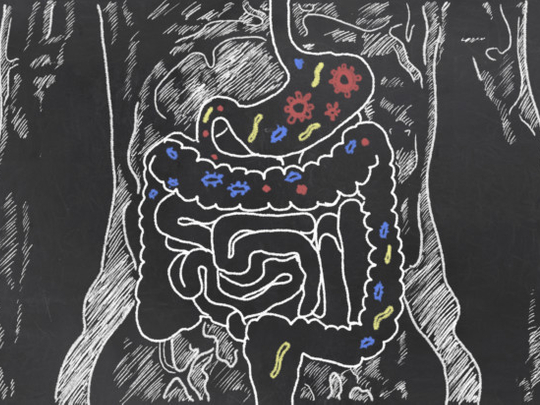
If you ever feel like it’s you against the world, consider how your gut microbiota feels. Your genes and your environment interact constantly, and your gut is the largest meeting point. On security duty is your microbiota, the collection of about 100 trillion bacteria and other microbes that live in your intestines, especially your large intestine (the colon). As scientists look for explanations for the roots of chronic disease as well as the connections between nutrition and health, the answer may be in your gut — and what you feed it.
One reason that the state of your intestinal ecosystem has a profound effect on your health is that one layer of cells is all that separates your immune system from the contents of your gut, and inflammation is our immune system’s main weapon against foreign invaders.
A healthy, balanced gut microbiota promotes a strong immune system and lower levels of chronic inflammation. An unhealthy microbiota has been linked to obesity, asthma, allergies and autoimmune disorders such as coeliac disease, Type 1 diabetes, inflammatory bowel disease and rheumatoid arthritis. Increasingly, chronic inflammation is also thought to be a root cause of cardiovascular disease, Type 2 diabetes and some forms of cancer.
Because everything we eat comes into contact with our microbiota, a diet high in refined, heavily processed foods will send our microbiota out of balance. The relationship between food and the microbiota is a two-way street: the food we eat affects the composition of our microbiota, and the composition of our microbiota affects how we digest and absorb our food.
The connection between what we eat and the health of our microbiome is complex, but a plant-based diet with lots of fibre and regular consumption of fermented foods nourishes and stimulates beneficial bacteria, which over time can shift the balance of your microbiota in a healthier direction.
Your microbiota adapts to its environment, and if that environment doesn’t provide the fibre it needs, your microbes will instead dine on the thin layer of mucus that protects your intestinal lining, potentially leading to a “leaky gut” and all number of health problems. So nurture a stable and diverse community of intestinal critters by offering them a fibre smorgasbord from a diet rich in vegetables, fruits, whole grains and pulses (beans and lentils). These foods are rich in “prebiotic” fibre, or dietary fibre that escapes digestion in the small intestine but is fermented by the types of bacteria you want to have hanging around in your colon.
Although many plant foods contain fermentable, prebiotic fibre, these are some of the richest sources: artichokes, asparagus, bananas, plantains, barley, rye, wheat, alliums (garlic, leeks, onion), brassicas (broccoli, cabbage, Brussels sprouts), jicama, lentils, chickpeas, red beans and soy products. If you aren’t eating a lot of fibre-rich foods, increase your intake slowly. Some prebiotic fibres can cause flatulence if you eat too much, too soon. They can also provoke symptoms in some people who have irritable bowel syndrome.
Good food for your microbiota also comes from resistant starch, which is found in whole grains as well as in cooked and cooled pasta, rice and potatoes. Some people find that it’s easier to boost intake of resistant starch than fibre.
Properly fermented foods are teeming with beneficial, health-promoting microbes, or probiotics. When you eat these foods regularly, they may help maintain or improve the population of good microbes in your gut. Eat probiotics in the form of fermented dairy products such as unsweetened yogurt and kefir (fermented milk), fermented soy foods such as tempeh and miso, or fermented vegetables such as sauerkraut, pickles and kimchi. Look for “live food” or “contains live cultures” on these products.
Diets high in saturated fat are harmful to microbiota diversity, so opt for plant-based sources of monounsaturated fats such as olive oil, avocados, nuts and seeds. Another way to reduce saturated fat is to include more plant-based meals in your week, a la Meatless Monday.
Eating food rich in prebiotic fibre along with fermented foods promotes the growth of bacteria that break down plant starches and fibres into short-chain fatty acids (SCFAs). Some SCFAs may protect against inflammation and cancer, while others help us absorb essential minerals from our food, including calcium, magnesium and iron.
Individuals who consistently eat plant-based diets, such as vegan, vegetarian or Mediterranean diets, tend to have higher levels of SCFAs. This suggests that the amount of fermentable fibre matters more than the diet itself. Because not all fibre is the same, when you eat a variety of whole plant foods you nourish the microbes that can break down that fibre and encourage a more diverse and robust gut ecosystem overall.
–Washington Post
Carrie Dennett is a registered dietitian nutritionist.













